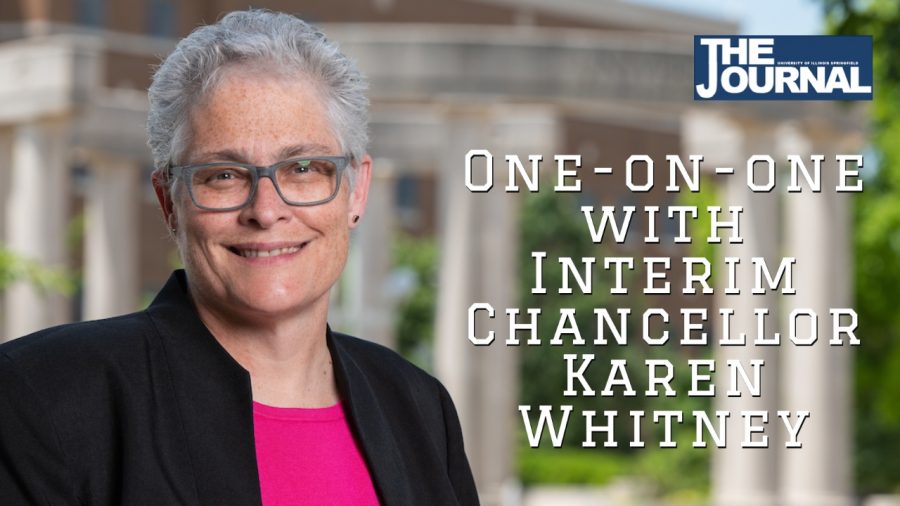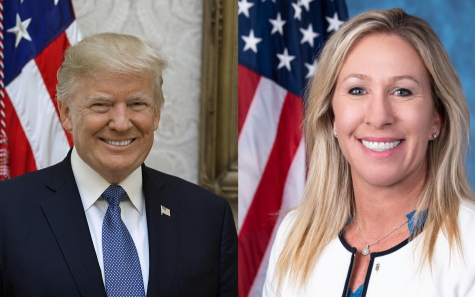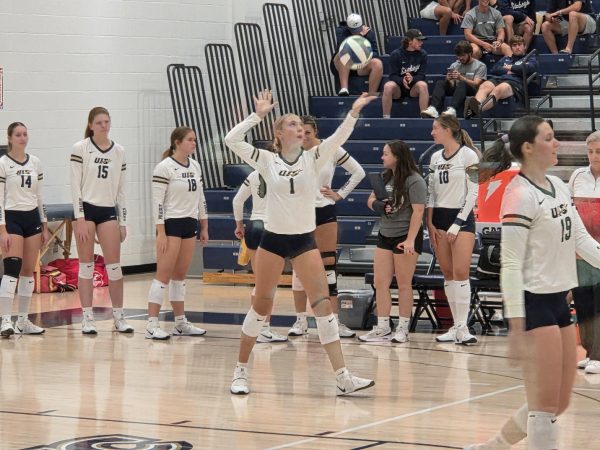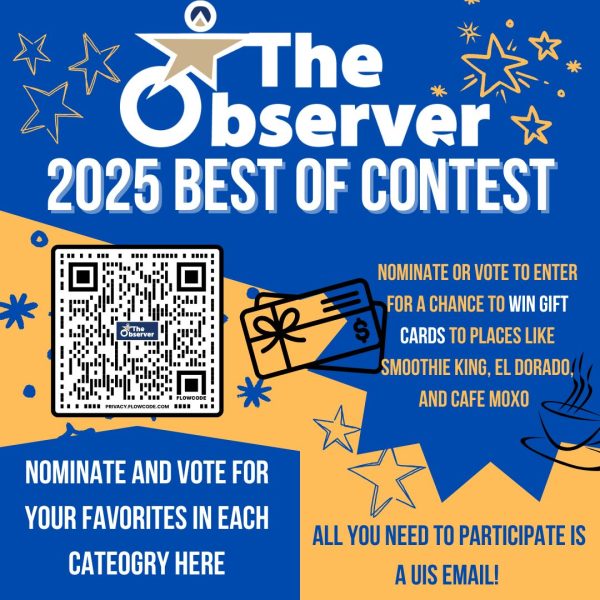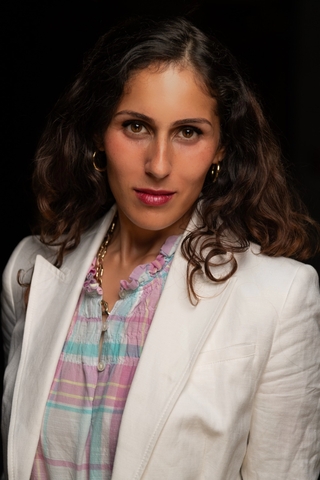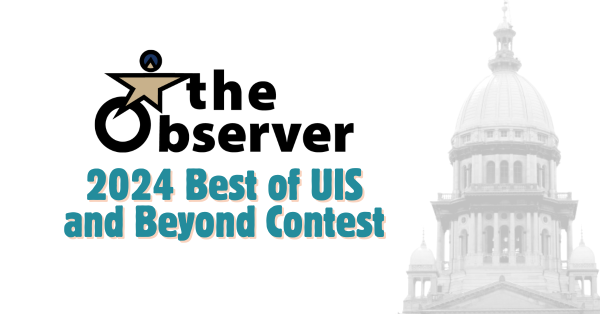Interview with Interim Chancellor Karen Whitney
The Journal’s Brooks Crawford recently held an interview with Interim Chancellor Karen Whitney where he talked with her about the ongoing COVID pandemic and the Fall 2021 semester here at UIS. Below is the transcript from that interview.
Brooks Crawford: Hi, Chancellor Whitney. Thank you so much for taking time out of your day to speak with me.
Interim Chancellor Whitney: Well, thank you.
Brooks Crawford: So the Delta variant has continued to be of increasing concern. The University of Illinois system made the decision to mandate vaccines even before the recent mandate by Governor Pritzker. What was the decision-making process in mandating a vaccine that has really been so controversial?
Interim Chancellor Whitney: Well, I know there’s been controversy throughout the country. There hasn’t really been much controversy at the University. I think our decision process has was informed by the last 18 months of our lived experience. But I would say it’s not like there’s like this moment where you make a decision, we’re kind of on this long, unfortunately, what’s become a long term road of COVID. And so you know, it almost every step of the way. You know, we’re, we’re learning, we’re, it’s almost like we plan, do learn, plan, do, learn, and it’s a constant. You know, if you think about this last August, we instituted, you know, with the, you know, internationally now known, you know, saliva testing protocols from Urbana-Champaign. We started saliva testing in August of last year of 20. And so now we’re like in what month 13 on that we caught we learned a lot with that. And its benefits of the data for the individual. So individually, you and I know it, you know, our status with COVID.
But then we use that larger data appropriately to understand our operation. How are we doing? Where was COVID on our campus who was being affected by it so that we could make informed decisions? You know, we wouldn’t overreact. We wouldn’t underreact. And at the same time, the data allowed us to talk with people to keep people well informed, to build confidence that we were acting in that what I call that responsible middle ground, we weren’t overdoing it, we weren’t underdoing it. We were informed, and our commitment was public safety, ensuring that this University stayed open and operating that students for what they wanted to do here, which I hope was around learning in living, and have your college experience could keep doing that. For our employees, it’s about safety in the workplace, so they can do what they’ve been asked to do. And we’ve been doing that throughout all of COVID.
So it wasn’t an immediate decision made over the summer. It evolved over time. And now certainly, as we went from only having saliva testing as a tool with COVID. And then the introduction, if you remember of vaccines that became available for like healthcare workers in January and February, it grew to larger populations of our society. Throughout the spring into the summer, that tool became available to us. And we started tracking data on that. We surveyed students and employees back in the spring; how do you feel about vaccination? What are your personal thoughts? What actions do you see yourself taking? What do you hope the University would do? So we kept a continued engagement of stakeholders and leaders. We have a terrific approach to what we call shared governance, its ways we engage the faculty and students. And so it was a continual dialogue of discussion and data gathering that then led us to consider, okay, what’s the best way we could go into this fall semester to have the college experience our students were telling us they wanted? That was the sum of how we got to our policy approaches today.
Brooks Crawford: So Dr. Fauci actually came out recently and talked about how he expects booster shots to be needed for those who have gotten the vaccine. Would booster shots be available to those on campus, perhaps? Or is that something that we’d have to talk about later?
Interim Chancellor Whitney: It’s too early to know exactly. We have an excellent relationship with the county health department, and what the county knows, they can count on us as a partner. So they would give direction about COVID, which has been appropriate. We’ve established what I’ll call a chain of command, lines of control here. So you know, we wouldn’t decide that we would work. Our view is we work with County Public Health and say, Look, we are a public university. We’re here to be of service. What can we do? So like right now, we are a public site for saliva testing. We have had multiple clinics on vaccination. So I have every reason to believe at a certain point, but I don’t know when and I don’t know the conditions.
We will offer your shots. As we’ve been involved in this throughout this whole pandemic, I think there’s still some more to sort out. And I’m watching like you are in anyone else how this is unfolding. Because obviously, you know, our goal is my goal. My number one priority as Interim Chancellor is to keep us open through COVID. To keep us on our mission through COVID. And my personal goal is nobody dies, and no one ends up in the hospital. That is my personal commitment to every student and employee. So far, to my knowledge, nobody has died, and one person went to the hospital, they quickly recovered. And I think that’s pretty good so far.
Brooks Crawford: Now, the University is seeing the lowest enrollment numbers since its first freshman class in 2001. How much does this have to do with COVID mitigations?
Interim Chancellor Whitney: Well, we’re unbundling that right now that now that we’ve gotten the numbers this week and doing a deep review on, you know, as a university, what have we done? What could we do better, both curricular and administratively, when it comes to the recruitment and the retention of our students. So it can’t be surprising that last year was a heck of a weird year to recruit. And, and also, and you probably can reflect on this personally, Brooks, is that UIS is the kind of place that it’s still relatively new, and we have to do a lot of extra work even to tell people we’re here. And not only that we’re here, but what we offer, the college experience that we’re now offering to people. That’s the harder thing. And so I think the feedback, the first feedback I got when I asked the question myself, of the folks who really do the admissions and the recruiting was this was the first answer that they knew was pronounced, we’re deeply looking at it, I can tell you, I’m not fixed so much on a number, I’m fixed on our mission. And I think more people in Illinois need a degree and advanced degrees beyond high school. And you know, in some people, the best thing that will help them live their lives and achieve their dreams is a community college or college or University. So that’s what I want. It’s a mission, passion for me, and I think more folks need something after high school. We have a lot to offer. And we need to tell our story better. We need to work with prospective students and their families on how to get to UIS and that we’re here for them and tell them how supportive we are because this is a very supportive place. The faculty are personally committed to teaching. The staff is committed. I mean, when I see the amount of work this summer, on all the personal phone calls and text messages and emails to students about do you want to learn online? Or do you want to learn back on campus? It was unprecedented. It was really incredible. And that makes us unique. And we need to get that word out.
Brooks Crawford: Are there any current numbers of who is on campus? And how many people are on campus? And how many people aren’t on campus? I don’t see why there’s not quite as busy, at least from the outside. So I wasn’t sure if there was what kind of ratio we were looking at?
Interim Chancellor Whitney: Well, we have, you know, a lot more swayed by twice as many classes on the ground this Fall than last Fall. So it’s almost like your question is, well, compared to what point in time pre-pandemic, or which would have been Fall of ’19, Fall ’20. And now Fall ’21. So we’re not back to where we were a Fall ’19. But, on the other hand, we are doing a lot more than last Fall, substantially more. Our housing is more. We have more classes on campus, and student organizations are more active. They have more significant numbers of people in them.
You know, I think so you have to consider which one you’re talking about. I mean, we’re definitely COVID informed, particularly as long as we’re at what I call the high transmission level in Sangamon County. We’ve gotten more sophisticated. We’re tracking on- we’ve set our policy as such that when the transmission level goes down to low or moderate, according to the CDC. We’re going to introduce even more activities back to campus. If you’re vaccinated, you won’t have to wear a mask inside. So as things get better because of people, we’re finding through our data that people aren’t getting COVID on campus. They’re getting COVID out in the community.
I mean, generally speaking, and so as that gets better, we’ll get better. I think there were just some people, and I get it, who were like, you know, it’s one thing or the other. It’s a mixed bag. Some people said like, I don’t want to get vaccinated, I don’t want to learn online. I’m going to step away, and we know who they are. We’ve had conversations, and we’re like, we respect that, and as soon as this is done, we’ll come on back. So I call folks a stopped out. And we’ll be here. So if you look at the long game, that’s fine. Some folks said, “Hey, I got a really good job, there are jobs around here a whole lot, I’m going to go do that as well.” Okay, that’s fine. You know, so you get a mixed bag of what folks want to do. And we are located in the capital city; we’ve got to be flexible. You know, we’re not the kind of place that says if you can’t do it this way, you can’t come. That’s not us. You know. So I think that’s where I look at a lot of those numbers. I think without COVID, we would have had a fine enrollment. We would have probably been where we were this Fall before. So it is definitely COVID. And for a variety of reasons, though. And some of them are good. The worst thing is for somebody to try to take classes and struggle and not do well. That would be the worst thing.
Brooks Crawford: You know, COVID or not? Less enrollment does mean does typically mean less revenue. Are there any budgetary concerns moving forward, especially in regards to cutting programs or classes?
Interim Chancellor Whitney: What right now, for a variety of reasons. I mean, in Illinois, higher- ed has been financially fragile for decades. I mean, since I believe there’s a thing called the impasse in 2013-14. So I mean, it’s been fragile. For a while, pre-COVID, COVID made things more challenging, that’s for sure. So money is always something one has to be super thoughtful of. Also, there’s just the thoughtfulness we should have when we’re taking your money. We’re taking your money and tuition and fees. And so my whole career, I’ve spent a lot of time figuring out how we should honor the money we take from you. And what do we do in terms of goods and services and programs that honor that sacrifice? I mean, I put myself through college as an undergrad. It was a sacrifice. I worked 1-3 jobs. And I had fortunately qualified for some grants, I took out a couple of loans, but it was a sacrifice. So the money is always an issue. And yes, we are in the middle of right now reorganizing departments and colleges. We’re introducing new academic programs. And when you do that, you always have to then re-look at other academic programs. Let me be clear here, that it shows that over time, students don’t want there to be consumerism here. There is a demand here that we need to be aware of and not be oblivious to. There are always programs that sunset or leave us because they’re no longer relevant. I mean, there were business colleges that used to teach typewriting or, you know, I’m making up stuff. I don’t want to insult any discipline or program. But some programs have become less in demand. And we as a University have to respect that. And we actually should be forward-looking and embrace what students want. And then also, what does Illinois need? What do Illinois employers want? And, you know, and then bring it together?
Brooks Crawford: I do agree with you that UIS does a very good job of with a staff of keeping everybody kind of in order or your teachers working closely with students, to say the least. But you know, is there anything for the University is special looking to do to kind of boost enrollment numbers?
Interim Chancellor Whitney: Well, couple of things we’re, we’re introducing in October the half-semester, a cadre of master’s programs in business that we’re going to launch nationally that we think will have good traction. They’re high in demand. They’re being delivered in a really in a format that I think will be easily accessible. And we’re doing some different things in how we market it to a national audience. So we’re looking at building up this year of our graduate program enrollments in terms of the undergraduates. For all students, we are looking at a whole reorganization of financial aid and getting financial aid packages to students sooner in their cycle of either if you’re new students sooner and when you decide where you’re going to go. And if you’re a current student in a more timely way, that is, you’re registering each semester, you’ve got confidence in what your financial aid will be. So I think that my goal is for the money to not be the deciding factor on if you come to UIS and how we do that for the students and their families. And that’s a huge priority for us, and we’re hiring more people in financial aid. We’re streamlining the processes. We’re going to be communicating more. So we’re looking at, you know, the high-impact things that we could do in financial aid registration and recruitment to make it easier and joyful to come to us and kind of reduce that. The only thing that should be stressing students are the academic rigors, not all this other stuff.
Brooks Crawford: Your term as interim Chancellor is coming to an end within the next year if I’m not mistaken. What is the selection process kind of looking like as of right now? And maybe when can we expect an announcement?
Interim Chancellor Whitney: My appointment ends June 30, 2022. And the whole search is run out of the President’s office. And I anticipate President Killeen will be issuing a statement early this semester. I don’t know exactly when. He does know that many people are curious and interested in the search. It will be a national search. I can tell you right now a search firm is being retained to work with a search committee. I can also tell you that pursuant to the campus senate bylaws, over the summer, the Campus Senate did send to the President a roster of names of people they recommended to serve on the search committee. So I can tell you, those steps have occurred. And I anticipate very soon that there’ll be an announcement on a search firm and an announcement of who has agreed to serve on a search committee. I can tell you because I have either administered or worked around multiple searches like this for presidents and chancellors. So it’ll be an open process. There will be a time where the search committee and consultant will be listening to constituents, students, faculty, staff, alumni, community members, and there’ll be a listening campaign about, you know, what is it that everyone hopes to see in the next Chancellor? What experiences, skills, dispositions, past accomplishments would you expect to see in the next Chancellor? So they can successfully serve you going forward. So there’ll be an open process for that. There’ll be many ways people can contribute to that, and then there’ll be a selection. And then, at some point, there will be campus interviews. At some point, people will get to see candidates, and they will get to be involved. Again, though, they’re not hiring the person. The President hires the Chancellor. And at the same time, it is part of UIS and UI culture to engage with people and listen.
Brooks Crawford: Then finally, you know, we do have, like I said, to increase concern over the Delta variant. What do you hope to see on campus this semester? You know, can students expect more in-person events and things of that sort?
Interim Chancellor Whitney: Yeah, think of this. Again, I always say this. I do the COVID briefings at one o’clock. We’re still doing those. We’ve done them, now over a year, at 1 pm. You can go to our COVID site and get the link or stuff like that. It’s a roller coaster, Brooks. COVID is a roller coaster. And right now, we’re kind of like here with high transmission. When it goes back down, and it will, it will. The transmission levels will go back down in Sangamon County and the surrounding counties, and when it goes back down, the masks go down. When the transmission- because we are a highly vaccinated campus with over 90% of our students and faculty being vaccinated. Can you imagine if our country was at 90-94% vaccination? What that would mean for us right now.
Brooks Crawford: I can only imagine.
Interim Chancellor Whitney: I can only wish that the country would follow UIS. You know what, because we’re showing it right now. So as that transmission level goes down in the county, the mask will go down. We’ll increase the number of in-person events. Right now, we’re doing hybrid, like maybe a few people in a room, and then you can zoom in. Well, so as that goes down, we get more of the campus life we want. And I’m very optimistic that at a certain point, even in this Fall semester, that will happen. And we’ve got from an event planning standpoint – students have been great as they’re planning events. We’ve got two versions, the high transmission, but we can do the other version when it goes down. And I can’t wait for that. I’m looking forward to being in the Union without my mask, drinking my latte. And I’m looking forward to being in Sangamon Auditorium, and I’m looking for you know, but you know. We’re making progress. We are doing more campus activities and events than we did last Fall. And that’s our road ahead.
Brooks Crawford: Well, I appreciate you taking your time out of your day to speak with me. And I thank you for helping me out with this.
Interim Chancellor Whitney: Well, I appreciate you trying to tell our story. And certainly, if you post the video or anything like that on a link anywhere, I’d love it if you sent it to me. I like your work, and I just appreciate the time that you’re taking. Because I know, and you know this, UIS is a good University, we are doing good work, and you’re helping us tell that story.
Brooks Crawford: Absolutely. I’ve been here for a couple of semesters. Oh, well, I guess this is going to be my last semester. It’s been a couple of years now. I applaud you for everything you know. You have to step into this role, especially with everything going on. That cannot be easy. But yeah. I’ve had a heck of a time here on campus. Not in a bad way, a good way. So I get to make the best out of a bad situation.
Interim Chancellor Whitney: So well, that forms character, doesn’t it? So anything, college degree, and some character building? Now you know what that’s, that’s the measure of us not thriving in good times. But it’s courageously thriving in tough times. And that’s what this has done. And so I’m, I love being here. I’m honored to serve. And I can’t imagine spending a pandemic with a better group of people.
Brooks Crawford: Absolutely. We’ve done a heck of a job out here. So thank you so much again for talking with me.
Interim Chancellor Whitney: Thanks, Brooks. You have a good day, take care. Bye

